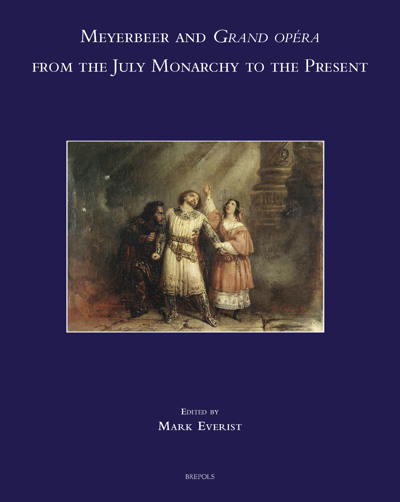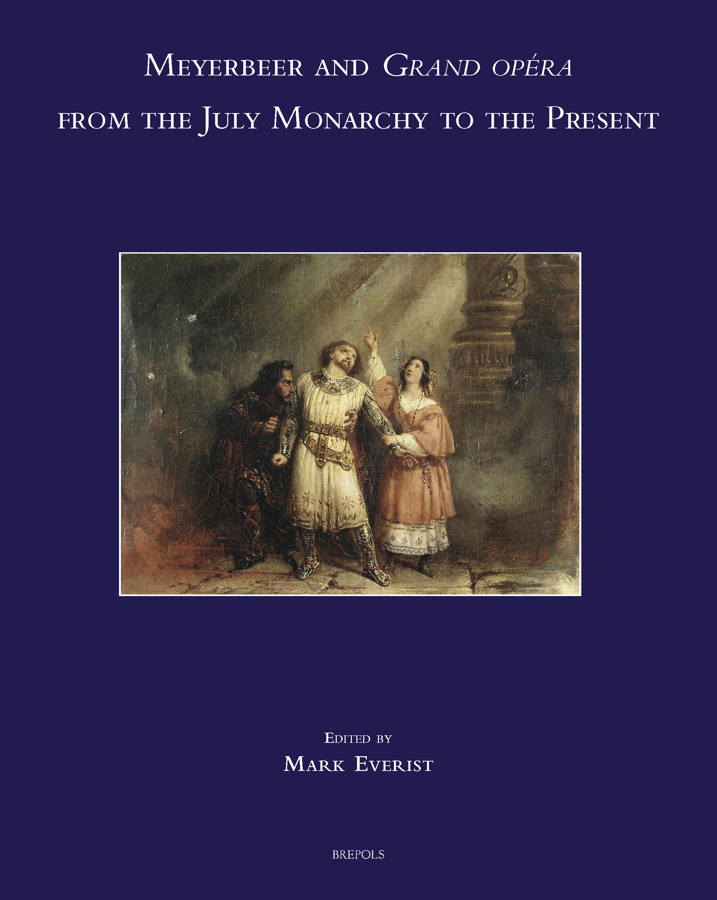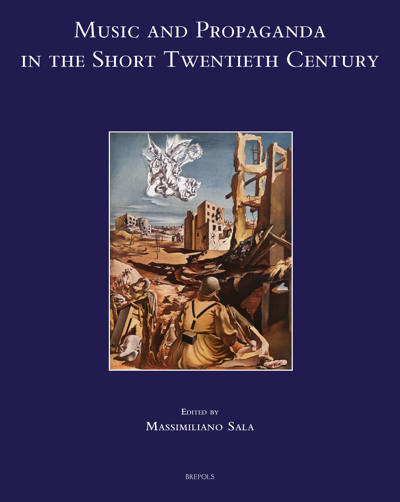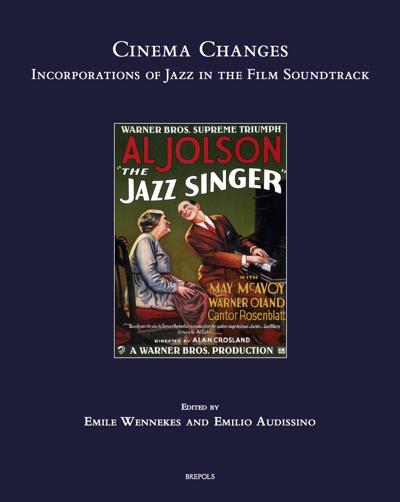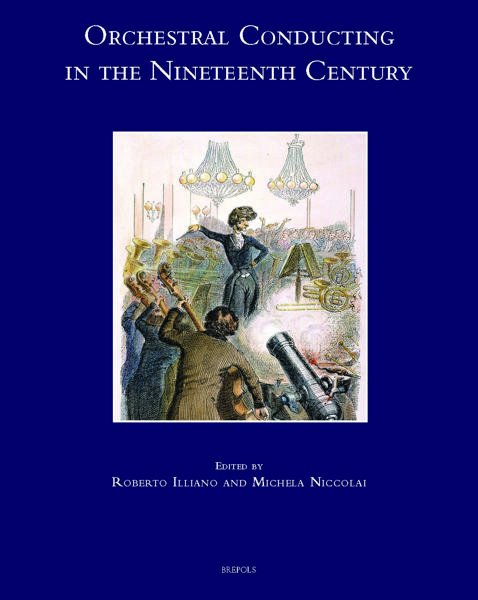
Meyerbeer and Grand Opéra from the July Monarchy to the Present
Mark Everist (ed)
- Pages: 498 p.
- Size:210 x 270 mm
- Illustrations:30 b/w, 8 col., 35 tables b/w.
- Language(s):English, French, Italian
- Publication Year:2016
- € 140,00 EXCL. VAT RETAIL PRICE
- ISBN: 978-2-503-56842-3
- Hardback
- Available
The book reflects on Meyerbeer and his work 150 years after his death
“On the basis of this volume, Meyerbeer studies is in very good hands, not least because of the diversity of approaches underpinning it (here including history, literature, dramaturgy, dance studies, performance and musicology) and the presence of a substantial number of early career scholars alongside established international names.” (Katharine Ellis, dans Revue de Musicologie, 105/2, 2019, 495-496)
Professor Mark Everist is a Professor of Music at the University of Southampton. Everist's research focuses on the music of western Europe in the period 1150-1330, French 19th-century stage music between the Restoration and the Commune, Mozart, reception theory, and historiography. He is the author of «Music Drama at the Paris Odéon, 1824-1828» (2002), «Giacomo Meyerbeer and Music Drama in Nineteenth-Century Paris» (2005), and «Mozart's Ghosts: Haunting the Halls of Musical Culture» (2012).
Giacomo Meyerbeer stands as one of the great paradoxes in music history. Widely regarded as the single most important opera composer in the middle third of the nineteenth century, the composer was recognised and revered all over the world. But by the middle of the twentieth century, his fortunes had completely reversed: his works were rarely performed, if at all, and much of the aesthetic of the genres in which he wrote had been called into question. Until relatively recently, his works were a by-word for the worst of nineteenth-century excess. More recent and measured views on Meyerbeer, his works and the milieu in which he was active, have gone a long way to both reconstruct the world at the epicentre of which he stood, and the reasons for his late-nineteenth and twentieth-century decline. While some of these are connected to changing operatic tastes and resources, others are more uncomfortable to confront in the light of mid-twentieth-century history. Reconstruction of the operatic world of the nineteenth century shows just how different it was to contemporary musical culture. The essays in «Meyerbeer and Grand opéra» reflect on the composer and his work 150 years after his death. They address fundamental questions about the composer and his relationship to his librettists, performers, and commentators, as well as the broader theatrical culture in which he worked. Contributors to the volume also reflect on the ways in which Meyerbeer’s works were received both during his lifetime and beyond.
Mark Everist
Guns and Roses: Meyerbeer Now and Then
Meyerbeer: The Key Works
Francesco Bertini
Il debutto italiano di Meyerbeer: nuovi documenti
su Romilda e Costanza (Padova 1817)
Stephanie Schroedter
Dance and Urban Reality: Meyerbeer, Modernity and Ballet Aesthetics
Mia Tootill
From the Boulevard to the Opéra and Back Again:
Meyerbeer’s Robert le diable
Jürgen Maehder
Giacomo Meyerbeer’s Robert le diable and Hector Berlioz:
Re-Inventing the Orchestra for the Académie Royale de Musique
Milan Pospíšil
Meyerbeer’s Les Huguenots in Prague and Austrian Censorship
Matthias Nikolaidis
Genèse et généalogie du ‘Marcel de Meyerbeer’.
Pour une dramaturgie alternative du troisième acte des Huguenots
Maria Nice Costantino
Wagner meyerbeeriano. Una ricognizione
sull’influenza di Les Huguenots sul Rienzi
Guillaume Bordry
Grand opéra, réclame et produits dérivés:
Le Prophète de Meyerbeer et le nonciorama
Melanie von Goldbeck
«Sie ist Kapellmeister, Régisseur — mit einem Wort, die Seele der Oper»:
Pauline Viardot and Le Prophète in London 1849
Marco Beghelli
Fidès / Fede: aspetti di una vocalità androgina
Paolo Russo
L’atto di Fidès. Questioni di drammaturgia
e segmentazione nel Prophète di Meyerbeer
Musical and Dramatic Techniques
Yaël Hêche
L’assimilation de Giacomo Meyerbeer par
Richard Wagner: l’exemple des contrastes simultanés
Evan Baker
Photographic Images of French Grand opéra:
Documentation of Nineteenth-Century Theatrical Production
Maria Birbili
Franco-Italian Legacy in Giacomo Meyerbeer’s Œuvre: Italian Opera’s
Formal Structures and the Reception of the French Revolution
Helena Kopchick Spencer
Eugène Scribe and the Jardin des Femmes Convention
Diana R. Hallman
Meyerbeer, Halévy, and the Scribean Libretto:
Correspondence and Divergence
Laura Moeckli
Narrative Pacing and Flashback in Meyerbeer’s Recitatives
Performance and Reception
Jennifer C. H. J. Wilson
Meyerbeer and the New Orleans French Opera Company
in New York City, 1845: «How, therefore, Could New York
Have Remained behind?»
Renato Ricco
«[…] il più grande artista di un periodo di transizione»:
Mazzini e Meyerbeer
Mark Everist
Meyerbeer and The Hound of the Baskervilles
John Gabriel
Ernst Krenek’s Leben des Orest and the Idea of a
Meyerbeer Renaissance in Weimar Republic Germany
Claire Paolacci
Giacomo Meyerbeer et les grands opéras
historiques français à l’Opéra de Paris entre 1915 et 1945
Biographies
Index of Names
